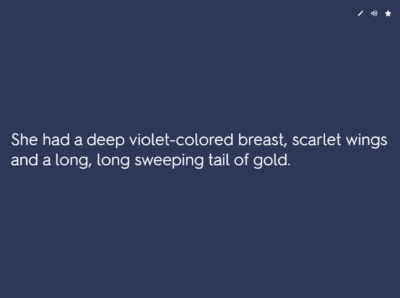『ドリトル先生航海記』 英文/和訳【1-5-2. ポリネシア】
※カラフル対訳で紹介している作品はすべてパブリックドメインです。
このサイトで使われている作品のすべては著作権の切れた名作などの全文を電子化して、インターネット上で公開しているProject Gutenberg(プロジェクト・グーテンベルク)、LibriVox(リブリヴォックス、朗読図書館)の作品を出典としています。
翻訳者:satoyayo4080
“Yes, that’s the place—Oxford,” said Polynesia “I knew it had cattle in it somewhere. Oxford—that’s the place he’s gone to.”
「そう、そこですーオックスフォードでした」とポリネシアは言った。「どこかに牛の名前が入っていると思っていたんです。オックスフォードーそこに行っているんです」
“Well, well,” murmured the Doctor. “Fancy[(人が…するのを)考えてもごらん] Bumpo studying at Oxford—Well, well!”
「そうかい、そうかい」と先生はつぶやいた。バンポがオックスフォードで勉強しているなんて。これはこれは」
“There were great doings in[へとへとにさせる] Jolliginki when he left. He was scared to death to come.
「バンポがジョリギンキ王国を離れる時は大変だったんです。こちらに来ることを死ぬほど怖がっていたんですから。
He was the first man from that country to go abroad. He thought he was going to be eaten by white cannibals[人肉を食べる人] or something.
あの国で外国へ行くのはバンポが初めてですからね。白人の人食い人種か何かに食べられてしまうと思ったんでしょう。
You know what those niggers are—that ignorant! Well!—But his father made him come.
あの黒人たちときたら無知ですからね!まあ、それでも彼の父は彼をここへ寄こしたんです。
He said that all the black kings were sending their sons to Oxford now.
バンポの話では今、黒人の王様たちは皆、自分の息子たちをオックスフォードに送り込んでいるそうです。
It was the fashion, and he would have to go. Bumpo wanted to bring his six wives with him. But the king wouldn’t let him do that either.
それが流行っているそうで、行かなければならなかったのです。バンポは6人の妻たちを連れて来たかったんですが、王様はそれも許しませんでした。
Poor Bumpo went off in tears—and everybody in the palace was crying too. You never heard such a hullabaloo.”[がやがや, 騒々しさ]
かわいそうにバンポは泣きながら旅にでたんです。宮殿のみんなも泣いていました。あんな大騒ぎは初めてでした。
“Do you know if he ever went back in search of The Sleeping Beauty?” asked the Doctor.
「彼が眠れぬ森の美女を探しにいったかどうかを知っているかい?」と先生は尋ねた。
“Oh yes,” said Polynesia—“the day after you left. And a good thing for him he did:
「はい」ポリネシアは答えた。「先生がお発ちになった後に。彼は良いことをしました。
the king got to know about his helping you to escape; and he was dreadfully wild about it.”
その(良いことである)、先生の逃亡の手助けを王が知るに至って、ひどく怒っていました」
“And The Sleeping Beauty?—did he ever find her?”
「それで眠れぬ森の美女は?見つけたのかい?」
“Well, he brought back something which he said was The Sleeping Beauty. Myself, I think it was an albino niggeress. [nigger + -ess(女性を示す名詞語尾)]
「ええ、彼はこれが『眠れぬ森の美女』だと言って何かを持ち帰ってきました。私が思うに、色素欠乏症の黒人女性だと思います。
She had red hair and the biggest feet you ever saw.
彼女は赤毛で見たことのないような大きな足をしていました。
But Bumpo was no end[際限なく] pleased[満足して] with her and finally married her amid[~の真ん中に] great rejoicings. The feastings lasted seven days.
でもバンポは彼女を非常に気に入り、ついに大喜びして結婚してしまいました。祝宴は7日間続きました。
She became his chief wife and is now known out there as the Crown-Princess Bumpah—you accent the last syllable.”
彼女は第一夫人となり今はバンパ王女として知られていますー最後の音節にアクセントをつけます」
“And tell me, did he remain white?”
「教えておくれ。彼はまだ白いままかい?」
“Only for about three months,” said the parrot. “After that his face slowly returned to its natural color.[生来の色]
「3ヶ月くらいだけです」と、そのオウムは言った。「その後彼の顔は徐々に元の色に戻っていきました。
It was just as well. He was so conspicuous[人目につく] in his bathing-suit the way he was, with his face white and the rest of him black.”
それでよかったんですよ。彼の水着姿は顔だけ白くて他の部分が黒いのでとても目立っていましたから」
“And how is Chee-Chee getting on?—Chee-Chee,” added the Doctor in explanation to me, “was a pet monkey I had years ago.
「チーチーはどうしているかね?チーチーは、」先生は私に説明するためにつけ加えた。「チーチーというのは何年も前に飼っていたペットの猿のことさ。
I left him too in Africa when I came away.”
アフリカを出発するとき、それも置いてきたんだ」
“Well,” said Polynesia frowning,—“Chee-Chee is not entirely happy. I saw a good deal of[沢山の] him the last few years.
「はぁ」とポリネシアは顔をしかめて言った。「チーチーはあまり幸せそうではありません。私はここ数年かなり頻繁に彼を見てきました。
He got dreadfully[ものすごく] homesick for you and the house and the garden.
彼は先生や先生の家や庭が恋しくてたまらないんです。
It’s funny, but I was just the same way myself. You remember how crazy I was to get back to the dear old land?[昔の土地]
変な話ですが、私も同じような感じでした。先生は私がどれほど恋しいアフリカの地に戻りたがっていたか覚えていると思います。
And Africa is a wonderful country—I don’t care what anybody says.
そしてアフリカは素晴らしい国です。(アフリカが素晴らしい国だということに対して否定的な)誰かが何と言おうと気にしません。
Well, I thought I was going to have a perfectly grand time.
そう、私は(アフリカに帰ることで)まちがいなくすてきな時を過ごせることと思っていたのです。
But somehow—I don’t know—after a few weeks it seemed to get tiresome. I just couldn’t seem to settle down.
でも、どういうわけか、私にはわからないのですが、数週間もするとアフリカにあきあきしてしまったのです。どうも落ち着【く】かないのです。
Well, to make a long story short, one night I made up my mind that I’d come back here and find you. So I hunted up old Chee-Chee and told him about it.
そう、かいつまんで話せば、ある夜私はここに戻ってきてあなたを見つけようと決心をしたのです。そこで親愛なるチーチーを探し出しそのことを話しました。
He said he didn’t blame me a bit—felt exactly the same way himself. Africa was so deadly quiet[静まり返っている] after the life we had led with you.
彼は、私を責める気は少しもない、自分も同じように感じていたと言いました。先生と一緒に過ごした生活の後のアフリカでの生活は、まるで墓場のように退屈なものでした。
He missed the stories you used to tell us out of your animal books—and the chats we used to have sitting round the kitchen-fire on winter nights.
彼は先生が動物図鑑を取り出してしてくれた話しや、冬の夜に台所の火を囲んでよくしたおしゃべりを寂しがっていました。
The animals out there were very nice to us and all that.
あそこにいる動物たちは私たちにとてもいい子たち、その他もろもろです。
But somehow the dear kind creatures[生き物] seemed a bit stupid.[愚かに] Chee-Chee said he had noticed it too.
しかし、どういうわけか、その親切な動物たちがなぜか少しつまらなく見えるのです。チーチーもそれに気づいていたと言いました。
But I suppose it wasn’t they who had changed;[変わった] it was we who were different.[変わっている]
しかし彼らが変わっているのではなく、私たちが普通ではないのだと思います。
When I left, poor old Chee-Chee broke down and cried.
私が出発する時、かわいそうに、チーチーは泣き崩れてしまいました。
He said he felt as though[~かのように] his only friend were leaving him—though, as you know, he has simply millions of relatives[近縁の動物たち] there.
彼はまるで唯一の友人がいなくなってしまう気がすると言いました。ご存じのように彼にはまったく、何百万もの仲間がいるのにです。
He said it didn’t seem fair that I should have wings to fly over here any time I liked, and him with no way to follow me.[私を追う方法がない]
彼は私は好きな時にいつでもここに飛んでこれる翼を持っているのに、彼には一緒にくる術がないのは不公平だと言いました。
But mark my words, I wouldn’t be a bit surprised if he found a way to come—some day. He’s a smart lad,[(年齢に関係なく)男, 元気のいい男] is Chee-Chee.”
しかし、私はいいかいよく聞くんだ、おまえがいつか戻って来る方法を見つけたとしても私は少しも驚かないだろう。おまえは賢いからな、チーチー。(と励ましたのです。)
At this point[この時点で] we arrived at my home.
そうこうしているうちに私たちは私の家に到着した。
My father’s shop was closed and the shutters were up; but my mother was standing at the door looking down the street.
父の店は閉まっていてシャッターが上がっていた。しかし、母はドアの前に立って通りを見下ろしていた。
“Good evening, Mrs. Stubbins,” said the Doctor. “It is my fault your son is so late. I made him stay to supper while his clothes were drying.
「こんばんは、スタビンズ夫人」と先生は言った。「息子さんがこんなに遅くなったのは私のせいです。服が乾くまでの間、夕食にひきとめていたんですよ。
He was soaked to the skin; and so was I. We ran into one another in the storm and I insisted on[主張した] his coming into my house for shelter.”
スタビンズ君もわしも全身びしょぬれで、嵐の中で鉢合わせになり、わしが彼にわしの家に避難するように言ったのです。
“I was beginning to get worried about him,” said my mother. “
「心配してたところです」と母は言った。
I am thankful to you, Sir, for looking after him so well and bringing him home.”
「ありがとうございます。大変ご親切にしていただいたうえに家にまで連れていただいて」
“Don’t mention it—don’t mention it,” said the Doctor. “We have had a very interesting chat.”
「どういたしまして、お礼には及びません」と先生は言った。「とてもおもしろい話ができたんでね」
“Who might it be that I have the honor of addressing?”[私がご挨拶させていただいているのはどなたですか?] asked my mother staring at the gray parrot perched on the Doctor’s shoulder.
「ところであなたはどちらさまでしょうか」と母は先生の肩にとまっている灰色のオウムを見つめながら尋ねた。
“Oh, I’m John Dolittle. I dare say your husband will remember me. He made me some very excellent boots about four years ago.
「わしはジョン・ドリトルと言います。おそらく、あなたのご主人はわしを覚えてくれているでしょう。ご主人には4年ほど前にとても素晴らしい靴を作ってもらったことがあります。
They really are splendid,”[りっぱな] added the Doctor, gazing down at his feet with great satisfaction.
とても素晴らしい靴でしたね」と付け加え、先生はとても満足げに自分の足を見下ろした。
“The Doctor has come to cure my squirrel, Mother,” said I. “He knows all about animals.”
先生はリスを治療しに来てくれたんだよ、お母さん」と私は言った。「先生は動物のことをすべて知り尽くしているんだ」
“Oh, no,” said the Doctor, “not all, Stubbins, not all about them by any means.”
「いやいや、」と先生は言った。「そんなことないよ、スタビンズ君。決してすべてではないよ」
“It is very kind of you to come so far to look after his pet,” said my mother.
「この子のペットを診るために、こんなに遠くまで来てくださるとは、ご親切に」と母は言った。
“Tom is always bringing home strange creatures from the woods and the fields.”
「トムはいつも森や野原から奇妙な生き物を家に連れて帰るんですよ」
“Is he?” said the Doctor. “Perhaps[ことによると] he will grow up to be a naturalist some day. Who knows?”
「そうなのかい?」と先生は言った。「もしかしたら彼はいつか博物学者になるかもしれないですね。誰にもわからないですからね」
“Won’t you come in?” asked my mother. “The place is a little untidy[乱雑な] because I haven’t finished the spring cleaning yet.
「お入りになりませんか?」と母は尋ねた。「春の大掃除がまだ終わっていないので、部屋は少し散らかっていますが。
But there’s a nice fire burning in the parlor.”
でも応接室には暖かい火が燃えています」
“Thank you!” said the Doctor. “What a charming home you have!”
「ありがとう」先生は言った。「すてきな家ですね」
And after wiping[ぬぐい落とす] his enormous[巨大な] boots very, very carefully on the mat, the great man passed into[移動する] the house.
大きな靴をマットの上で何度も丁寧に拭いた後、そのえらい人は家の中に入っていった。
対訳を使った瞬間英作文の練習
和訳を使った瞬間英作文の練習には①スマホでスクロールを上手に活用して和訳と英文を交互に見るか、②パソコンの場合なら下記のクイズレットの単語カードを利用する、のが便利です。模範解答である英文を見ることでよりネィティブに近い表現力を身につけることができます。



